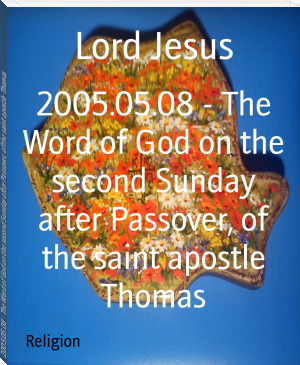The Story of a Soul - Saint Thérèse de Lisieux (best color ereader .TXT) 📗

- Author: Saint Thérèse de Lisieux
- Performer: -
Book online «The Story of a Soul - Saint Thérèse de Lisieux (best color ereader .TXT) 📗». Author Saint Thérèse de Lisieux
This is not true of the sainted authoress of the chapters that follow—"less radiant," in the medium of a translation. In her own inimitable pages, as in those of a Campion or an Ignatius, a Teresa of Avila, or a John of the Cross—the Spirit of Poetry is the handmaiden of Holiness. This new lover of flowers and student of the stars, this "strewer of roses," has uplifted a million hearts from the "base earth" and "black fog" to the very throne of God, and her mission is as yet but begun.
The pen of Soeur Thérèse herself must now take up the narrative. It will do so in words that do not merely tell of love but set the heart on fire, and at the same time lay bare the workings of God in a soul that "since the age of three never refused the Good God anything." The writing of this Autobiography was an act of obedience, and the Prioress who imposed the task sought, in all simplicity, her own personal edification. But the fragrance of its pages was such that she was advised to publish them to the world. She did so in 1899 under the title of L'Histoire d'une Âme. An English version by M. H. Dziewicki appeared in 1901.
This new translation relates more fully the story of the childhood, girlhood, and brief convent days of Soeur Thérèse. It tells of her "Roses," and sets forth again, in our world-wide tongue, her world-wide embassy—the ever ancient message of God's Merciful Love, the ever new way to Him of "confidence and self-surrender."
The Editor. ______________________________
[1] The baptismal entry, with its numerous signatures, is shown to visitors, and a tablet in the baptistry of the beautiful Gothic church tells the pilgrim that here the "Little Queen" was made a child of God. [Ed.]
[2] "As Little Children": the abridged life of Soeur Thérèse. Published at the Orphans' Press, Rochdale.
[3] Francis Thompson.
______________________________
THE AUTOBIOGRAPHY OF SOEUR THÉRÈSE OF LISIEUX, ENTITLED BY HERSELF: "THE STORY OF THE SPRINGTIME OF A LITTLE WHITE FLOWER"______________________________
CHAPTER I EARLIEST MEMORIESIt is to you, dear Mother, that I am about to confide the story of my soul. When you asked me to write it, I feared the task might unsettle me, but since then Our Lord has deigned to make me understand that by simple obedience I shall please Him best. I begin therefore to sing what must be my eternal song: "the Mercies of the Lord."[1]
Before setting about my task I knelt before the statue of Our Lady which had given my family so many proofs of Our Heavenly Mother's loving care.[2] As I knelt I begged of that dear Mother to guide my hand, and thus ensure that only what was pleasing to her should find place here.
Then opening the Gospels, my eyes fell on these words: "Jesus, going up into a mountain, called unto Him whom He would Himself."[3]
They threw a clear light upon the mystery of my vocation and of my entire life, and above all upon the favours which Our Lord has granted to my soul. He does not call those who are worthy, but those whom He will. As St. Paul says: "God will have mercy on whom He will have mercy.[4] So then it is not of him that willeth, nor of him that runneth, but of God that showeth mercy."[5]
I often asked myself why God had preferences, why all souls did not receive an equal measure of grace. I was filled with wonder when I saw extraordinary favours showered on great sinners like St. Paul, St. Augustine, St. Mary Magdalen, and many others, whom He forced, so to speak, to receive His grace. In reading the lives of the Saints I was surprised to see that there were certain privileged souls, whom Our Lord favoured from the cradle to the grave, allowing no obstacle in their path which might keep them from mounting towards Him, permitting no sin to soil the spotless brightness of their baptismal robe. And again it puzzled me why so many poor savages should die without having even heard the name of God.
Our Lord has deigned to explain this mystery to me. He showed me the book of nature, and I understood that every flower created by Him is beautiful, that the brilliance of the rose and the whiteness of the lily do not lessen the perfume of the violet or the sweet simplicity of the daisy. I understood that if all the lowly flowers wished to be roses, nature would lose its springtide beauty, and the fields would no longer be enamelled with lovely hues. And so it is in the world of souls, Our Lord's living garden. He has been pleased to create great Saints who may be compared to the lily and the rose, but He has also created lesser ones, who must be content to be daisies or simple violets flowering at His Feet, and whose mission it is to gladden His Divine Eyes when He deigns to look down on them. And the more gladly they do His Will the greater is their perfection.
I understood this also, that God's Love is made manifest as well in a simple soul which does not resist His grace as in one more highly endowed. In fact, the characteristic of love being self-abasement, if all souls resembled the holy Doctors who have illuminated the Church, it seems that God in coming to them would not stoop low enough. But He has created the little child, who knows nothing and can but utter feeble cries, and the poor savage who has only the natural law to guide him, and it is to their hearts that He deigns to stoop. These are the field flowers whose simplicity charms Him; and by His condescension to them Our Saviour shows His infinite greatness. As the sun shines both on the cedar and on the floweret, so the Divine Sun illumines every soul, great and small, and all correspond to His care—just as in nature the seasons are so disposed that on the appointed day the humblest daisy shall unfold its petals.
You will wonder, dear Mother, to what all this is leading, for till now I have said nothing that sounds like the story of my life; but did you not tell me to write quite freely whatever came into my mind? So, it will not be my life properly speaking, that you will find in these pages, but my thoughts about the graces which it has pleased Our Lord to bestow on me.
I am now at a time of life when I can look back on the past, for my soul has been refined in the crucible of interior and exterior trials. Now, like a flower after the storm, I can raise my head and see that the words of the Psalm are realised in me: "The Lord is my Shepherd and I shall want nothing. He hath set me in a place of pasture. He hath brought me up on the water of refreshment. He hath converted my soul. He hath led me on the paths of justice for His own Name's sake. For though I should walk in the midst of the shadow of death, I will fear no evils for Thou are with me."[6]
Yes, to me Our Lord has always been "compassionate and merciful, long-suffering and plenteous in mercy."[7]
And so it gives me great joy, dear Mother, to come to you and sing His unspeakable mercies. It is for you alone that I write the story of the little flower gathered by Jesus. This thought will help me to speak freely, without troubling either about style or about the many digressions that I shall make; for a Mother's heart always understands her child, even when it can only lisp, and so I am sure of being understood and my meaning appreciated.
If a little flower could speak, it seems to me that it would tell us quite simply all that God has done for it, without hiding any of its gifts. It would not, under the pretext of humility, say that it was not pretty, or that it had not a sweet scent, that the sun had withered its petals, or the storm bruised its stem, if it knew that such were not the case.
The Little Flower, that now tells her tale, rejoiced in having to publish the wholly undeserved favours bestowed upon her by Our Lord. She knows that she had nothing in herself worthy of attracting Him: His Mercy alone showered blessings on her. He allowed her to grow in holy soil enriched with the odour of purity, and preceded by eight lilies of shining whiteness. In His Love He willed to preserve her from the poisoned breath of the world—hardly had her petals unfolded when this good Master transplanted her to the mountain of Carmel, Our Lady's chosen garden.
And now, dear Mother, having summed up in a few words all that God's goodness has done for me, I will relate in detail the story of my childhood. I know that, though to others it may seem wearisome, your motherly heart will find pleasure in it. In the story of my soul, up to the time of my entry into the Carmel, there are three clearly marked periods: the first, in spite of its shortness, is by no means the least rich in memories.
It extends from the dawn of reason to the death of my dearly loved Mother; in other words, till I was four years and eight months old. God, in His goodness, did me the favour of awakening my intelligence very early, and He has imprinted the recollections of my childhood so deeply in my memory that past events seem to have happened but yesterday. Without doubt He wished to make me know and appreciate the Mother He had given me. Alas! His Divine Hand soon took her from me to crown her in Heaven.
All my life it has pleased Him to surround me with affection. My first recollections are of loving smiles and tender caresses; but if He made others love me so much, He made me love them too, for I was of an affectionate nature.
You can hardly imagine how much I loved my Father and Mother, and, being very demonstrative, I showed my love in a thousand little ways, though the means I employed make me smile now when I think of them.
Dear Mother, you have given me the letters which my Mother wrote at this time to Pauline, who was at school at the Visitation Convent at Le Mans. I remember perfectly the events they refer to, but it will be easier for me simply to quote some passages, though these charming letters, inspired by a Mother's love, are too often full of my praises.
In proof of what I have said about my way of showing affection for my parents, here is an example: "Baby is the dearest little rogue; she comes to kiss me, and at the same time wishes me to die. 'Oh, how I wish you would die, dear Mamma,' she said, and when she was scolded she was quite astonished, and answered: 'But I want you to go to Heaven, and you say we must die to go there'; and in her outburst of affection for her Father she wishes him to die too. The dear little thing will hardly leave me, she follows me everywhere, but likes going into the garden best; when I am not there she refuses to stay, and cries so much that they are obliged to bring her back. She will not even go upstairs alone without calling me at each step, 'Mamma! Mamma!' and if I forget to answer 'Yes, darling!' she waits where she is, and will not move."
I was nearly three years old when my Mother wrote: "Little Thérèse asked me the other day if she would go to Heaven. 'Yes, if you are good,' I told her. 'Oh, Mamma,' she answered, 'then if I am not good, shall I go to Hell? Well, you know what I will do—I shall fly to you in Heaven, and you will hold me tight in your arms, and how could God take me away then?' I saw that she was convinced that God could do nothing to her if she hid herself in my arms."
"Marie loves her little sister very much; indeed she is a child who delights us all. She is extraordinarily outspoken, and it is charming to see her run after me to confess her childish faults: 'Mamma, I have pushed Céline; I slapped her once, but I'll not do it again.' The moment she has done anything mischievous, everyone must know. Yesterday, without meaning to





Comments (0)